Ethnic Village Thrives on Ecotourism
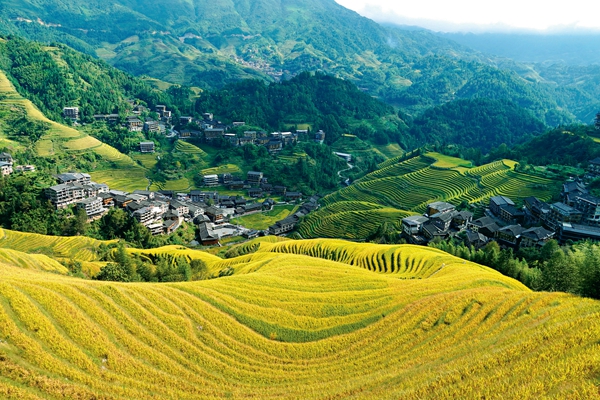
Dazhai, a village in South China's Guangxi Zhuang Autonomous Region, has been named one of the Best Tourism Villages of 2022 by the World Tourism Organization (UNWTO). Known for its breathtaking landscape of terraced fields, and for being home to the unique culture of the Red Yao ethnic group, Dazhai has been attracting an increasing number of tourists, from home and abroad, in recent months.
Dazhai is located in Longji, a town in Guangxi's Longsheng Ethnic Autonomous County. Both Dazhai and Jingzhu (a village in Southwest China's Chongqing Municipality) have been listed among the Best Tourism Villages of 2022 by UNWTO, thanks largely to their achievements in balancing tourism with economic development, while also adhering to environmental protection.
According to UNWTO, 32 villages in 18 countries or regions, including Austria, Chile and China, received the "best tourism village" designation in 2022. UNWTO launched the Best Tourism Villages initiative in 2021, to promote the sustainable development and cultural heritage protection of villages. To date, China has had four villages so designated; in addition to Dazhai and Jingzhu, the other two were Yucun, a village in East China's Zhejiang Province, and Xidi, a village in East China's Anhui Province.
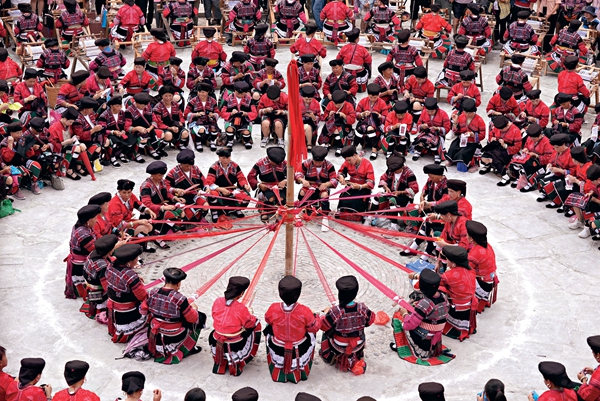
Terraced farming dates back more than 2,300 years in Dazhai. The village now has nearly 66 square kilometers of terraced fields. The villagers have cultivated paddy fields on the hillsides of Longji Mountain for generations, and those fields have formed the magnificent landscape of terraced fields.
There are several villages scattered on Longji Mountain, including Dazhai, Xiaozhai, Ping'an and Longji. All of the villages have terraced fields, which are collectively known as Longji Terraced Fields.
In 2018, the Food and Agriculture Organization of the United Nations designated the terraced fields in Dazhai as one of the Globally Important Agricultural Heritage Systems.
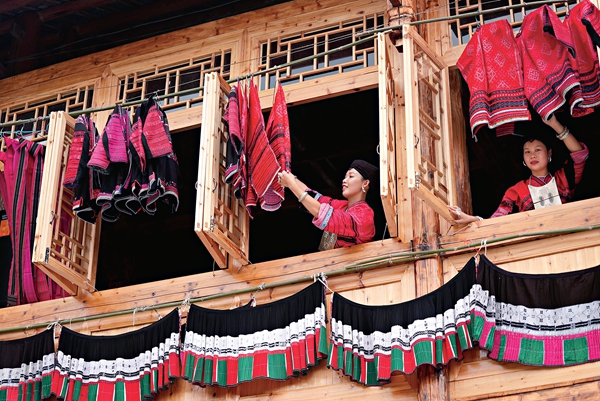
Affected by the climate, the terraced landscape changes with the seasons, and with weather conditions, to present colorful scenes. "The terraced fields are like silver belts in spring, green waves in summer, golden pagodas in autumn, and sleeping dragons in winter," says Pan Deying, a villager.
Red Yao is a branch of the Yao ethnic group, an ethnic group that favors red clothes. Red Yao people celebrate their annual Drying Clothes Festival on the sixth day of the sixth lunar month (usually a sunny day) by hanging up their distinctive red clothes.
The balconies and corridors of families in the village become filled with clothes, which are mainly bright red, to create a spectacular, daylong scene against the green mountains and terraces. The villagers believe the sunshine will bring them good fortune and help them escape bad luck.
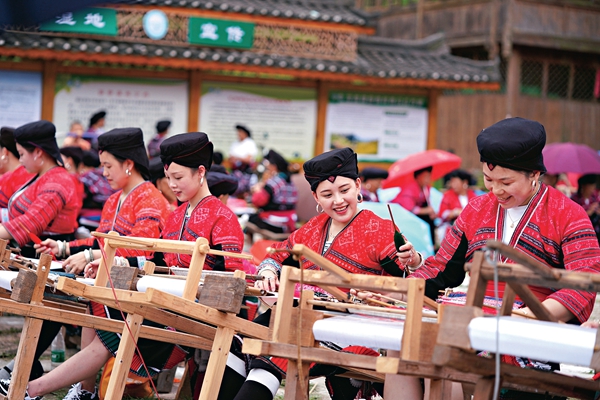
The Drying Clothes Festival, which dates to the Han Dynasty (206 BC-220 AD), is the second most important festival of the Red Yao ethnic group, after the Spring Festival.
Various ethnic activities are held to celebrate the festival, such as displaying clothes-making skills, holding a Red Yao group wedding ceremony and organizing a campfire party. The women wear traditional red clothes, while the men wear black.
The women gather in the village square to demonstrate their embroidering and clothes-making skills. They also hold dog-worshipping activities, as they believe the dog is their benefactor. Their local clothes also contain dog totems, to honor the animal.
"Only by being here can you feel the spectacular scenery of Longji Terrace, and the culture of Red Yao ethnic group, which is totally different from watching it on mobile phones," a tourist, surnamed Jiang, from Central China's Hunan Province, said when she visited Dazhai.
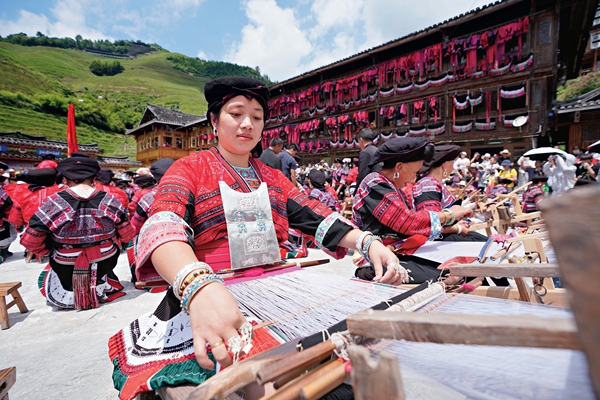
Figures released by the county's culture and tourism bureau indicate tourism development has resulted in tangible economic benefits for Dazhai's residents, especially the creation of jobs, since the village began developing its tourism industry more than 10 years ago.
According to the bureau, the village welcomed just 32,000 tourists in 2004, while the number surged to nearly 798,000 in 2019, before COVID-19 emerged. The village has 1,212 residents in 271 households. The villagers' average annual income has risen from 700 yuan (US $100), in 2004, to more than 34,500 yuan (US $4,928), in 2019.
The village received more than 600,000 visitors in 2021, despite the COVID-19 epidemic, and the village earned 528 million yuan (US $75.43 million) in tourism-related revenue that year.
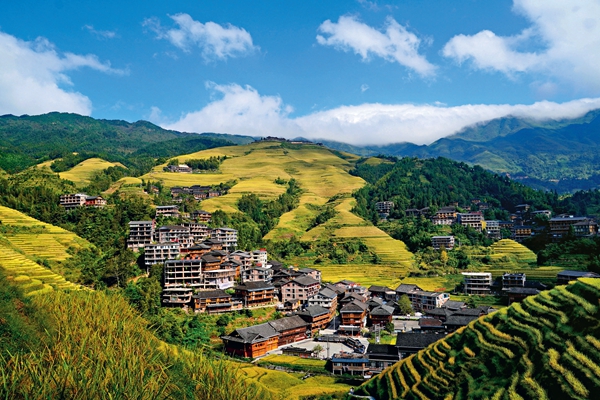
Upholding the concept of "planting the fields is creating the view," villagers have adhered to the fundamental principles of agricultural production, and they have strengthened the protection of terrace fields, to ensure the synchronous and sustainable development of agricultural production, environmental protection and tourism development. Villagers have also established a tourism-management committee.
Yang Qingguo, director of the county's culture and tourism bureau, says the village has been fostering a sustainable development model of agriculture, while also fostering a sightseeing and cultural experience of the Red Yao ethnic group.
"The Yao people have made their traditional costumes and customs highlights of the village's tourism, and the development of tourism helps channel funds and resources to the village's protection of its terraced fields and architecture. It's a sustainable life cycle," Yang says.
The village, he adds, will continue to develop tourism rooted in the Yao culture and the landscape, and it will introduce new offerings, such as helicopter trips and leisure resorts, to enrich people's experience.
Photos Supplied by VCG
(Women of China English Monthly February 2023 issue)
Please understand that womenofchina.cn,a non-profit, information-communication website, cannot reach every writer before using articles and images. For copyright issues, please contact us by emailing: website@womenofchina.cn. The articles published and opinions expressed on this website represent the opinions of writers and are not necessarily shared by womenofchina.cn.








.jpg)

 WeChat
WeChat Weibo
Weibo 京公网安备 11010102004314号
京公网安备 11010102004314号